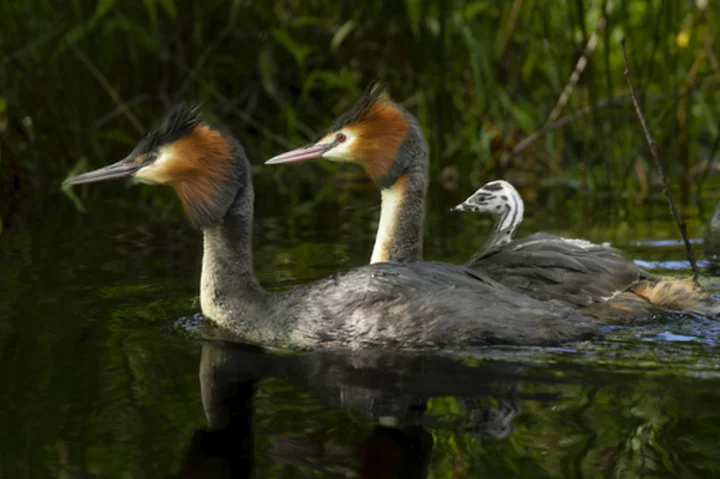WELLINGTON, New Zealand (AP) — Vote checkers in New Zealand have been so overwhelmed by foreign interference that they've been forced to delay announcing a winner.
The contest is to choose the nation's favorite bird and the interference is from comedian John Oliver.
Usually billed Bird of the Year, the annual event by conservation group Forest and Bird is held to raise awareness about the plight of the nation’s native birds, some of which have been driven to extinction. This year, the contest was named Bird of the Century to mark the group’s centennial.
Oliver discovered a loophole in the rules, which allowed anybody with a valid email address to cast a vote. So he went all-out in a humorous campaign for his favored bird, the pūteketeke, a water bird, on his HBO show “Last Week Tonight.”
Oliver had a billboard erected for “The Lord of the Wings” in New Zealand's capital, Wellington. He also put up billboards in Paris, Tokyo, London, and Mumbai, India. He had a plane with a banner fly over Ipanema Beach in Brazil. And he wore an oversized bird costume on Jimmy Fallon's “The Tonight Show.”
“After all, this is what democracy is all about," Oliver said on his show. “America interfering in foreign elections.”
Forest and Bird said vote checkers had been forced to take an extra two days to verify the hundreds of thousands of votes that had poured in by Sunday's deadline. They now plan to announce a winner on Wednesday.
“It's been pretty crazy, in the best possible way,” Chief Executive Nicola Toki told The Associated Press.
New Zealand is unusual in that birds developed as the dominant animals before humans arrived.
“If you think about the wildlife in New Zealand, we don't have lions and tigers and bears," Toki said. Despite nearly nine of every ten New Zealanders now living in towns or cities, she added, many retain a deep love of nature.
“We have this intangible and extraordinarily powerful connection to our wildlife and our birds,” Toki said.
The contest has survived previous controversies. Election scrutineers in 2020 discovered about 1,500 fraudulent votes for the little spotted kiwi. And two years ago, the contest was won by a bat, which was allowed because it was considered part of the bird family by Indigenous Māori.
Toki said that when the contest began in 2005, they had a total of 865 votes, which they considered a great success. That grew to a record 56,000 votes two years ago, she said, a number that was surpassed this year within a couple of hours of Oliver launching his campaign.
Toki said Oliver contacted the group earlier this year asking if he could champion a bird. They had told him to go for it, not realizing what was to come.
“I was cry laughing,” Toki said when she watched Oliver's segment.
Oliver described pūteketeke, which number less than 1,000 in New Zealand and are also known as the Australasian crested grebe, as “weird, puking birds with colorful mullets.”
“They have a mating dance where they both grab a clump of wet grass and chest bump each other before standing around unsure of what to do next,” Oliver said on his show, adding that he'd never identified more with anything in his life.
Some in New Zealand have pushed back against Oliver’s campaign. One group put up billboards reading: “Dear John, don't disrupt the pecking order,” while others urged people to vote for the national bird, the kiwi. Oliver responded by saying the kiwi looked like “a rat carrying a toothpick.”
“For the record, all of your birds are great, and it would be an honor to lose to any of them when the results are announced on Wednesday," Oliver said on his show. “The reason it is so easy for me to say that is that we aren't going to lose, are we? We are going to win, and we are going to win by a lot.”

